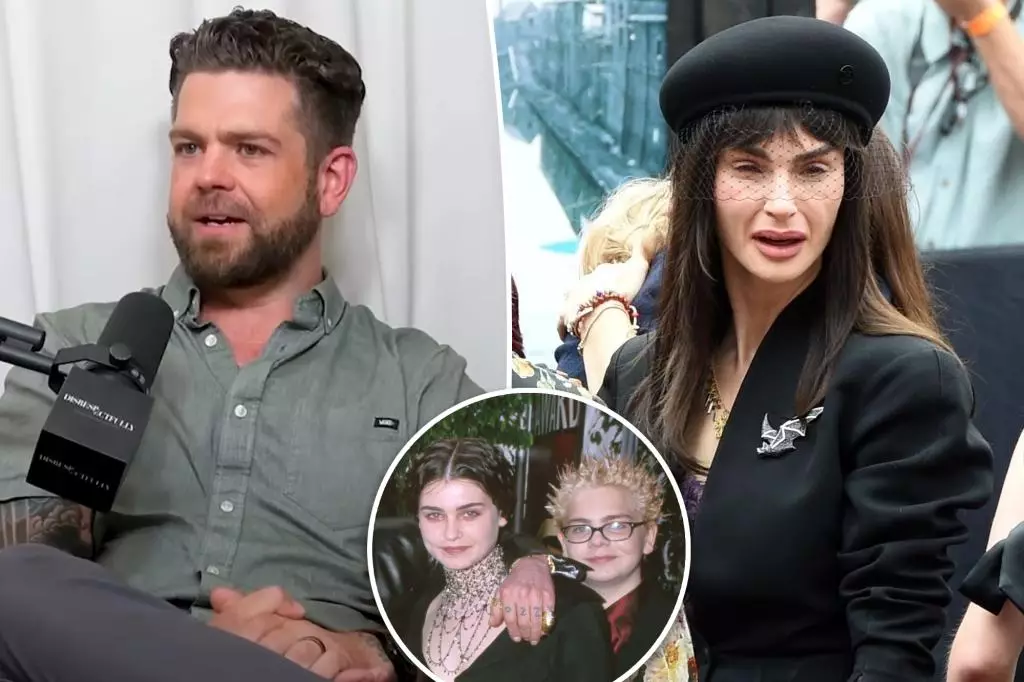The Osbourne family’s narrative is often painted with vibrant strokes of rock and roll legend, resilience, and unbreakable bonds. However, behind the scenes, crumbles a story of fractured relationships, stubborn pride, and emotional isolation. Jack Osbourne’s candid confession about his estranged relationship with his sister Aimee just days before their father Ozzy’s passing challenges the romanticized image many hold of this iconic family. It exposes a layered reality where love and estrangement coexist, and where personal choices shape familial bonds in tumultuous and sometimes tragic ways.
What makes this revelation so compelling is Jack’s blunt honesty. Rather than sugarcoat the discord, he openly admits, “We’re not close at all.” That honesty is rare from someone in the public eye, especially about issues as sensitive as family estrangement, and it invites us to reexamine the often-idealized portraits of celebrity families. The Osbournes, despite their fame, are not immune to the emotional complexities that define many families. Their struggles with privacy, individual identity, and generational gaps surface in a strikingly raw manner.
Aimee’s choice to remain out of the spotlight underscores a broader issue about authenticity and personal boundaries. Her decision to stay away from her family’s reality TV fame in pursuit of a private life highlights a desire for agency over her own narrative, yet it also seems to have contributed to an emotional chasm. The fact that she left at 16 hints at a desire to carve out an existence free from the invasive glare of fame—a desire many young individuals share but which can unfortunately embed deep-seated familial rifts.
Fame’s Toll and the Cost of Personal Choice
The Osbourne family’s story reveals how fame can be both a magnifier of love and a catalyst for alienation. Aimee’s deliberate retreat from their televised life reflects her attempt to preserve her sense of self amidst a tumult of public scrutiny. Her mother Sharon’s regret and heartbreak over her decision serve as poignant reminders of the emotional costs tied to early independence and personal choice. She recognizes, perhaps too late, that forcing a child into the limelight can have long-term repercussions on familial bonds.
The family’s history of estrangement is also a testament to how differences in worldview and personality can clash dramatically when compounded by fame. Kelly Osbourne’s remark about their disconnect underscores a universal truth: understanding and acceptance are often missing in relationships that are shaped by starkly contrasting perspectives. Kelly’s admission that she and Aimee “don’t understand each other” demonstrates a profound emotional distance that transcends the surface of sibling camaraderie.
Despite years apart, moments of reunion—such as at Ozzy’s funeral—serve as symbolic reminders that estrangement does not erase familial ties, but it can complicate their expression. The paid tribute jewelry, including Aimee’s bat brooch referencing Ozzy’s infamous bat-biting incident, underscores that these familial bonds are layered with shared history, nostalgia, and unresolved conflicts. It is a poignant illustration of how grief can temporarily bridge gaps, forcing families to confront their collective pasts, even if reconciliation remains elusive.
Fame, Choice, and the Search for Authenticity
The Osbourne saga exemplifies the often overlooked toll that fame exerts on personal relationships. Aimee’s desire to maintain an obscure, private existence reflects a universal longing for authenticity in an industry obsessed with image and exposure. Her stance against appearing on “The Osbournes” reveals her awareness that the cost of fame might outweigh its rewards, especially when it risks damaging her mental health and familial connections.
What’s evident is that personal boundaries are crucial for mental well-being and identity, but they are also inherently resistant to the magnifying glass of public scrutiny. Aimee’s life choices highlight a broader societal issue—how do individuals, especially those raised in the limelight, forge authentic identities separate from their family legacies? Her retreat from the spotlight signifies her assertion of independence, a necessary step for many who find fame oppressive or misaligned with their authentic selves.
Meanwhile, Jack’s openness about their estrangement demonstrates a growing acceptance that not every family’s story can be neatly resolved. His acknowledgment that their relationship is fractured at points introduces a second layer of complexity to the narrative—one where honesty becomes a tool for understanding rather than denial. The painful reality of their dynamic is a testament to the importance of accepting uncomfortable truths and understanding that love does not always manifest as closeness, especially in a world marred by fame and individual ambitions.
In the end, the Osbourne family’s story is a reminder that beneath the spectacle, human beings grapple with universal issues—identity, love, regret, and forgiveness. Their journey suggests that, even amidst celebrity and tragedy, the path to familial reconciliation is often found through painful honesty and acceptance, rather than glossed-over portrayals of perfection.

